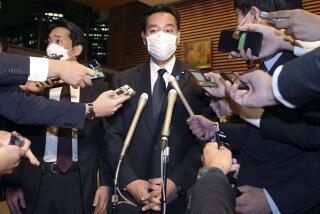Pension Lapse Forces Koizumi Aide Out
TOKYO — A top government official was forced to resign Friday after revelations that he and six other Cabinet ministers had failed to make payments to the mandatory state pension plan.
Chief Cabinet Secretary Yasuo Fukuda, a powerful aide to Prime Minister Junichiro Koizumi, stepped down after it emerged that he had missed pension contributions for a total of nearly three years.
“The trust of the nation has been lost as a result of the nonpayment of pension premiums,” Fukuda said. “I behaved inappropriately. I want to take responsibility by resigning.”
The scandal erupted as the government was attempting to steer a law through parliament to shore up Japan’s ailing pension system by increasing contributions from citizens. The rapid aging of Japan’s population has severely strained the system. By 2025, according to some estimates, there will be one pensioner for every two workers.
As the government’s top spokesman, Fukuda is one of Japan’s best-known politicians, and his resignation was seen as an embarrassment for Koizumi.
Fukuda was seen as a possible future leader of Japan and was particularly influential on foreign policy issues.
The pension system has been plagued by poor collection rates, especially among self-employed, part-time and temporary workers. The government says that more than one-third of self-employed workers and more than half of Japanese in their 20s do not pay their current $120-a-month premiums.
For a large number of citizens, the payments are not taken from their paychecks, leaving it up to the employees to make good their contribution.
Many Japanese fear the system will collapse and believe that paying into it is throwing money away. The government has been reduced to appealing for payment through advertising campaigns using celebrities, but was embarrassed this year after it was revealed that Makiko Esumi, an actress appearing on its posters, had not been making her full contribution.
Over the last two weeks, Japanese have learned that such senior government officials as Economics Minister Heizo Takenaka and Finance Minister Sadakazu Tanigaki, who were involved in drafting the pension legislation before parliament, also had missed payments into the system at some stage. Trade Minister Shoichi Nakagawa admitted that he had not made payments for more than 20 years. The ministers blamed oversight for their nonpayment.
“Paying your pension is a tax obligation,” said Noriyuki Takayama, a professor at the Institute of Economic Research at Hitotsubashi University. “In the U.S. you can be jailed for tax evasion. Yet here we have politicians with very serious responsibilities and passing laws who haven’t been paying. How can that be justified?”
The scandal has generated widespread public disgust.
“I can’t find the words to express myself,” said Hiromu Gomi, a 65-year-old retiree. “I have properly paid my pension contributions, but of course one loses the will to pay when it turns out that the people who made the system have opted out. It is little wonder young people don’t pay.”
Takashi Kawamura, the Democratic Party of Japan politician whose persistent questioning in parliament led to the revelations of nonpayment, said the prime minister himself has evaded the question of whether he has missed payments, saying he has been too busy to check.
Fukuda’s resignation was seen as an attempt to limit damage to Koizumi’s administration. Political pundits believe he probably will be invited back to the Cabinet after elections in July.
The damage to Koizumi has been offset by revelations that the leader of the Democratic Party of Japan, the main opposition party, at one point had missed payments for 10 months. Naoto Kan, the party chief and a former health minister, was resisting pressure Friday to resign.
*
Hisako Ueno of The Times’ Tokyo Bureau contributed to this report.
More to Read
Sign up for Essential California
The most important California stories and recommendations in your inbox every morning.
You may occasionally receive promotional content from the Los Angeles Times.










